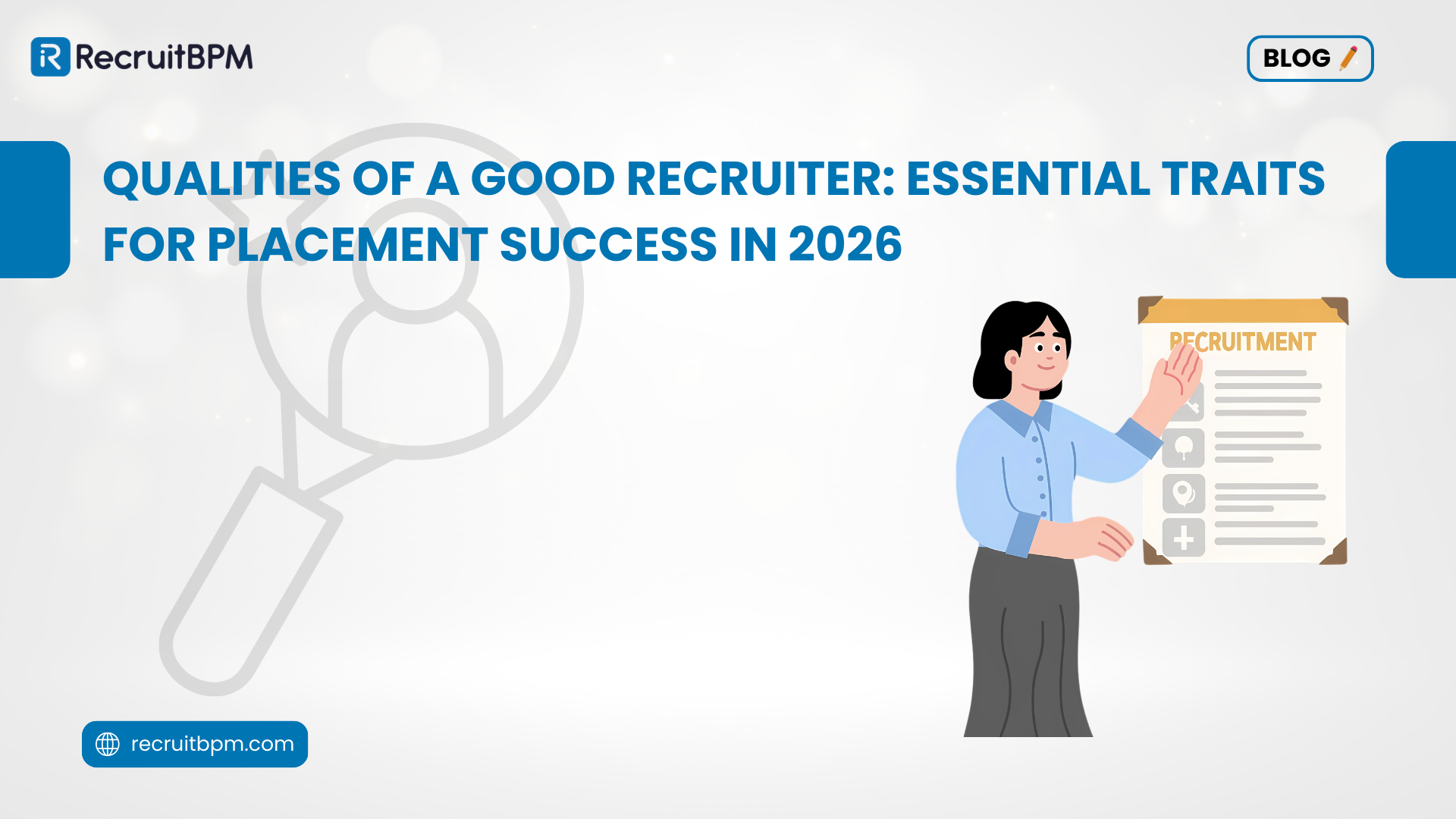Bad hires cost companies up to 30% of that employee’s first-year salary. Yet most staffing agencies still evaluate recruiter performance on placement volume alone, ignoring the qualities that actually produce those numbers.
The qualities of a good recruiter in 2026 go far beyond sourcing resumes and booking interviews. Your recruiters are now precision operators working inside an employer’s market. Clients expect faster fills. Candidates expect a personalized experience. AI tools are reshaping every stage of the pipeline.
This guide breaks down what separates high-performing recruiters from average ones this year. You will find the soft skills that build lasting relationships, the operational habits that protect your agency’s reputation, the 2026-specific skills reshaping the role, and the platform support that makes everything else possible.
What Makes a Good Recruiter in 2026?
The job title has not changed. The job itself has significantly.
Recruiters are no longer administrators moving candidates through a funnel. They are strategic talent advisors who influence business outcomes, shape employer brands, and operate in one of the most demanding hiring environments in years. Understanding this shift is where building a high-performing recruiting team begins.
How the Recruiter’s Role Has Shifted in an Employer’s Market?
The balance of power in hiring has moved back toward employers. Companies are more selective, budgets are tighter, and every open role carries real pressure to fill it correctly the first time.
According to HR Dive, organizations entering 2026 are focused on precision hiring, not volume sprees. That shift means your recruiters cannot rely on broad pipelines and hope for the best. They need sharper candidate evaluation, tighter client alignment, and clearer judgment about which roles deserve the deepest attention.
Recruiters who thrive in this environment treat every placement as a strategic decision, not a transactional handoff.
Why Staffing Agency Recruiters Face Unique Pressure This Year?
Agency recruiters operate under a different set of pressures than their in-house counterparts. You are managing client relationships, candidate pipelines, and revenue targets simultaneously, often across multiple industries and role types.
That multi-layered responsibility means the qualities of a good recruiter at a staffing agency extend well beyond interpersonal skills. You need operational discipline to stay organized at scale, and the emotional stamina to maintain quality when everything moves fast, and the margin for error is slim.
The Real Cost of a Weak Recruiter on Your Team
A poor placement does not just damage one client relationship. It reduces repeat business, raises your cost-per-hire, and chips away at the agency reputation you have spent years building.
The ripple effect of underperforming recruiters compounds quickly. That makes talent development a direct revenue priority, not a leadership nicety.
Core Soft Skills That Separate Great Recruiters From Average Ones
Technical skills move candidates through a process. Soft skills determine whether clients and candidates come back.
The most consistent finding across 2026 recruitment research is that soft skills now matter as much as or more than hard technical ability. A poll of 1,000 hiring managers found that 62% say both skill types are equally important, while 24% believe soft skills now outweigh technical ones. Your recruiters’ interpersonal qualities are measurable business assets, not personality bonuses.
Active Listening and Adaptive Communication
Strong recruiters do not just hear what candidates and clients say. They understand what those words mean beneath the surface.
Active listening means detecting what a hiring manager has not explicitly stated, the cultural tension hidden inside a job requirement, or the career anxiety behind a candidate’s hesitation. This directly improves placement quality and retention. When you understand what both sides actually need, you make matches that hold well past the 90-day mark.
Adaptive communication matters equally. Your tone, level of detail, and outreach channel should shift depending on whether you are engaging a passive C-suite candidate, an entry-level applicant, or a frustrated client. Rigidity in communication style costs you relationships.
Empathy and Emotional Intelligence Under Hiring Pressure
Candidates are making high-stakes career decisions. Clients are under board-level pressure to fill critical roles quickly. Great recruiters hold space for both realities without letting the tension collapse the process.
Emotional intelligence means reading a candidate’s hesitation before it becomes a full withdrawal. It means de-escalating a frustrated client without becoming reactive yourself. Research consistently shows that recruiter empathy improves candidate satisfaction and post-hire team dynamics. In a market where candidate experience is a genuine competitive differentiator, this trait carries direct commercial value.
Resilience: Staying Consistent When Deals Fall Through
Every recruiter loses placements. Candidates withdraw at the last minute. Clients change the brief mid-search. Offers collapse over compensation gaps at the final stage.
Resilience is not about staying relentlessly optimistic. It is about recovering focus quickly and returning to the work with the same standard of effort every single time. Recruiters who treat resilience as a deliberate habit, not just a reaction to setbacks, maintain higher output and longer agency tenure. That consistency is what clients recognize and reward with repeat business.
Operational Skills Every Successful Recruiter Must Master
Soft skills build trust. Operational skills determine whether your recruiter can deliver that trust consistently at volume.
Without strong operational habits, even the most personable recruiter becomes a bottleneck. These three capabilities keep performance consistent regardless of how many roles are open simultaneously.
Time Management Across Multiple Open Requisitions
Most agency recruiters manage between 10 and 30 open roles at any given time. Knowing which roles have the highest placement probability, which candidates are ready to move, and which clients need proactive updates before they have to ask is what separates efficient recruiters from overwhelmed ones.
Strong time management means working from a clear priority framework, not just reacting to whatever demands the loudest attention right now. Recruiters without this discipline let high-value searches stall while they chase low-probability roles that feel more urgent than they are.
Negotiation That Closes Offers Without Burning Bridges
Negotiation is one of the most undervalued recruiter skills. Your role is to advocate for both parties without visibly favoring either and to create outcomes both sides feel good about long after the placement is made.
Effective recruiter negotiation in 2026 focuses on transparency, value alignment, and knowing which variables have flexibility before the conversation starts. Recruiters who negotiate well reduce offer drop-offs, speed up close rates, and generate the kind of trust that produces referrals from both candidates and clients.
Attention to Detail That Protects Client Relationships
A missed detail in a candidate submission can cost you a client relationship that took years to build. Presenting a candidate whose salary expectation does not match the brief or overlooking a compliance requirement signals carelessness, regardless of how strong the candidate actually is.
Detail-oriented recruiters build a reputation for reliability that becomes a real competitive advantage over time. The agencies that scale sustainably are not always the fastest. They are the most consistent.
What Recruiter Skills Are Most In-Demand for 2026?
The recruiter skills landscape is evolving faster than most internal training programs can keep up with. Three shifts in particular are redefining what high performance looks like this year.
AI Fluency With Human Judgment: The Hybrid Skill Set
AI is no longer a differentiator for recruiters. It is a baseline expectation. The differentiator in 2026 is knowing how to combine AI efficiency with human judgment what researchers now call the hybrid skill set.
That means using AI tools to automate sourcing, screening, and interview scheduling, then applying your own evaluation to assess cultural fit, career trajectory, and candidate motivation, the signals that algorithms cannot reliably read. According to Metaview’s 2026 recruiting trends report, the best-performing recruiters combine technical fluency with storytelling and relationship management. Neither replaces the other. Both are required.
Skills-Based Candidate Evaluation Over Credential Matching
The shift from credential-based to skills-based hiring is one of the most significant changes in talent acquisition this year. Candidates are assessed on what they can demonstrably do, not where they studied or what their previous job title was.
For your recruiters, this means developing the ability to look beyond a resume and identify transferable competencies. It requires deeper intake conversations about role outcomes rather than job descriptions, and more nuanced assessments that explore adaptability alongside existing technical skills. Recruiters who still lead with credentials are leaving strong candidates undiscovered.
Precision Hiring: Using Data to Replace Gut Feeling
Intuition still matters. In 2026, it needs data behind it.
High-performing recruiters track source effectiveness, which channels produce the highest quality placements. They monitor time-to-fill across role types to identify where the process creates friction. They review 90-day and six-month retention data to validate placement quality over time. Recruiters who use this data do not just fill roles faster. They fill them with better long-term outcomes, which is what clients actually pay for.
How Does the Right ATS Amplify a Recruiter’s Best Qualities?
Your recruiters can have every trait on this list and still underperform if their tools create friction instead of removing it.
This is the operational gap most staffing agencies overlook until it is already costing them placements. The right platform does not just organize data; it actively amplifies what your best recruiters already do naturally.
From Manual Follow-Ups to Automated Candidate Pipelines
Manual follow-up is one of the biggest time drains in agency recruiting. When a recruiter tracks candidate status across a spreadsheet and a generic inbox, their attention fragments. Relationships that deserve personal attention receive generic emails. Candidates who needed a quick check-in slipped out of the pipeline entirely.
Automated pipelines inside a purpose-built ATS solve this directly. Your recruiters define the engagement rules once. The platform maintains the cadence. That frees your team to focus entirely on conversations that require human judgment, where their soft skills generate the most value.
Why Disconnected Tools Slow Down Even the Best Recruiters?
Fragmented tech stacks are one of the most common reasons high-quality recruiters underperform relative to their actual ability. When your ATS does not integrate with your CRM, recruiters waste time on duplicate data entry, lose visibility into client relationship history, and miss candidate engagement signals that a unified system would surface automatically.
The cost is not just lost hours. It is missed placements, slower response times, and a disjointed candidate experience, all of which reflect directly on your agency’s reputation with clients and candidates alike.
How RecruitBPM Gives Staffing Recruiters the Tools to Perform at Their Best?
RecruitBPM is a unified ATS and CRM built specifically for staffing agencies, recruiting firms, and executive search teams. Your recruiters manage candidate pipelines, client relationships, job distribution across 5,000+ job boards, automated workflows, and placement analytics, all from a single platform.
The soft skills, operational habits, and data fluency covered in this guide are not constrained by a tool that forces your team to work around it. Your recruiters perform better when their platform is built to work with them, not against them.
Ready to see how RecruitBPM supports your team? Book a demo and see the platform in action.
Role-Specific Recruiter Traits: Agency vs. In-House vs. Executive Search
The qualities of a good recruiter shift meaningfully depending on the environment in which they operate. Understanding these distinctions helps you hire the right recruiter for your context and develop existing team members in the right direction.
Staffing Agency Recruiters Speed, Volume, and Client Balance
Agency recruiters operate at a higher volume than any other recruiter type. Speed, multi-tasking ability, and active client relationship management are non-negotiable. Strong sales instincts also matter not just to win new mandates, but to persuade in-demand candidates that a role is worth their serious consideration.
Resilience is especially critical in agency settings, given the pace of rejection and the frequency of last-minute withdrawals that define day-to-day agency life.
In-House Recruiters Culture Fit and Long-Term Retention
In-house recruiters are evaluated on a longer time horizon. A hire who leaves at six months reflects directly on them, not just the hiring manager. That accountability demands deeper intake conversations, stronger cultural assessment capabilities, and closer working relationships with business stakeholders.
In-house recruiters also carry a stronger employer branding responsibility. Every candidate interaction is a brand touchpoint, whether or not that candidate ultimately receives an offer.
Executive Search Recruiters’ Discretion, Depth, and Senior Networks
Executive search demands an entirely different standard. Candidates are passive and often currently employed. Clients expect absolute confidentiality throughout the engagement. Every conversation requires senior-level business acumen alongside the ability to assess leadership qualities, not just functional expertise.
Network depth matters more here than anywhere else in recruiting. An executive search recruiter with a warm, trusted network of senior professionals in their niche will consistently outperform one relying on inbound applications or cold outreach at scale.
Frequently Asked Questions About Qualities of a Good Recruiter
What is the single most important quality of a good recruiter in 2026?
The single most important quality of a good recruiter in 2026 is the ability to combine human judgment with technology fluency, the hybrid skill set. Recruiters who use AI tools effectively while still assessing cultural fit, candidate motivation, and long-term potential consistently outperform those who rely on either technology or instinct alone. This combination is what defines top performance this year across every recruiter type.
How do you measure recruiter performance beyond placement count?
Strong recruiter performance metrics include placement retention at 90 days and six months, offer acceptance rate, source channel effectiveness, time-to-fill by role type, and candidate satisfaction scores. Placement count tells you how busy a recruiter is. These metrics tell you how effective they actually are. Tracking both gives leadership a complete and honest performance picture.
Can recruiter skills be learned, or are they natural traits?
Most recruiter skills develop with deliberate practice and consistent self-assessment. Resilience, communication, time management, and data fluency all improve through sustained effort and quality coaching. Traits like genuine curiosity and empathy are harder to teach but strengthen through candidate-first habits and structured feedback over time. The strongest agencies invest in skills development rather than assuming great recruiters arrive fully formed.
How does AI change what it means to be a great recruiter?
AI handles the high-volume tasks, such as resume parsing, initial screening, interview scheduling, pipeline reporting, and job board distribution. That frees great recruiters to focus on what AI cannot replicate: building genuine trust with candidates, reading between the lines in client conversations, evaluating cultural and strategic fit, and managing complex multi-party negotiations. AI raises the performance floor for all recruiters. Human skills determine the ceiling.
Great recruiters combine sharp instincts with disciplined operational habits, and they work inside platforms that remove friction rather than create it.
The qualities of a good recruiter do not exist in isolation. They compound. A recruiter with strong communication skills who also tracks placement data and works inside a unified ATS and CRM will consistently outperform one who has only one of those three strengths. That combination of human skill, operational discipline, and the right technology drives sustainable placement success.
Your agency’s competitive edge depends on developing recruiters who build all of these qualities and giving them a platform built to support them.
RecruitBPM is built for staffing agencies that take recruiter performance seriously. One platform. Every tool your team needs. No fragmentation, no workarounds. Book your demo today and see what your recruiters are capable of.

















